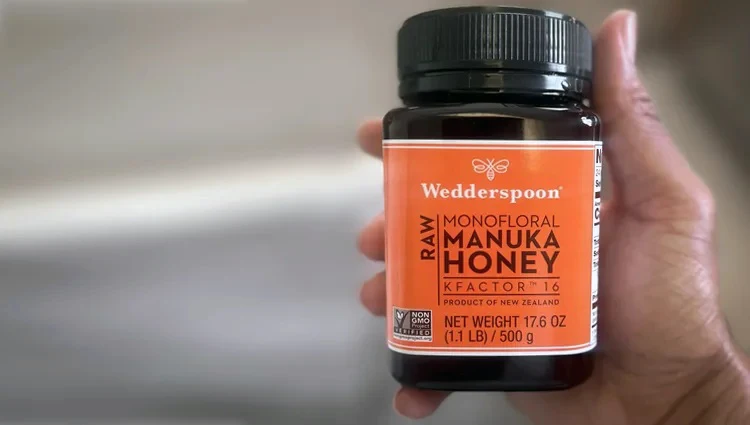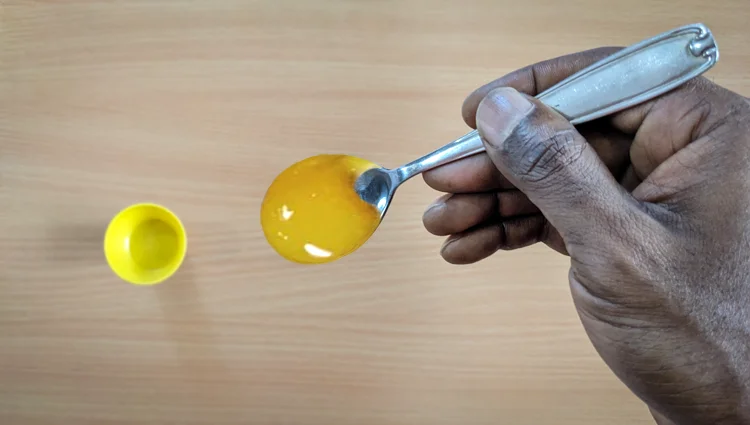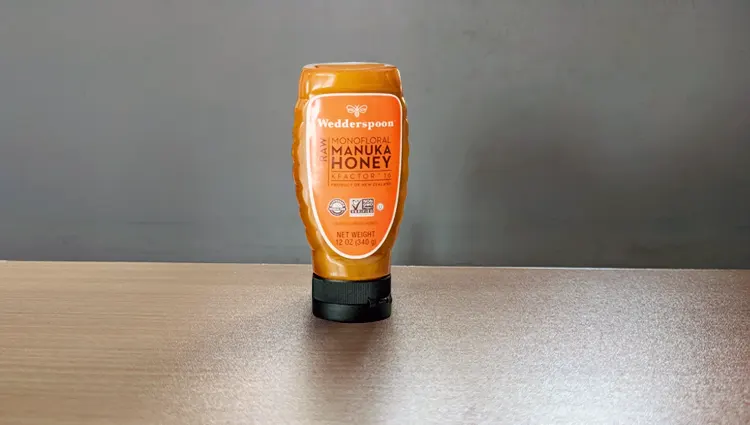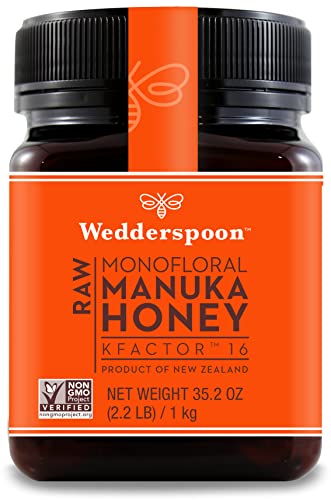Brand: Wedderspoon
Type: Multifloral & Monofloral
Grades Available: MGO 850+, KFactor 12 and KFactor 16
Country of Origin: New Zealand
Dietary Compliance: Gluten-free, Non-GMO
Certifications: Glyphosate Residue Free, The Fernmark License, Safe Quality Food (SQF), MPI Registered Exporter
Price: An 8.8-ounce jar of KFactor 16 rated Manuka Honey is priced at approximately $23.99.
Rating: 6/10
As someone who’s long been fascinated by the magic of manuka honey, my pantry is often stocked with jars from across New Zealand. Whether I’m seeking natural remedies or just a dollop of sweetness for my morning yogurt, I’ve come to rely on this golden nectar for so many things. During my quest for high-quality manuka honey that doesn’t stretch the budget too thin, I stumbled upon Wedderspoon—a brand that’s been quietly building a loyal fanbase worldwide.

You’ve probably seen Wedderspoon products before, with their sleek packaging and promises of raw, unpasteurized honey. From digestive gummies to soothing throat sprays, the brand offers a wide range of honey-infused goods. What intrigued me the most, however, was their KFactor grading system—a unique approach to assessing the quality of their honey.
But let’s be honest: affordable manuka honey often sparks a little skepticism. Can it really match the premium quality of UMF-certified honey? That’s what I set out to discover in this review. I’ll dive into the taste, purity, grades, and overall value of Wedderspoon’s manuka honey, with a focus on their KFactor 16 monofloral variety. By the end, you’ll know whether this is the honey jar you want to reach for—or if it’s better left on the shelf.
Taste and Appearance
Let me start with the good stuff—how it tastes! When I first opened a jar of Wedderspoon’s KFactor 16 monofloral honey, I was struck by its gorgeous golden hue and smooth, creamy texture. It’s slightly thinner than some of the chunkier manuka honeys I’ve tried, but it still spreads beautifully on toast or swirls easily into yogurt. The flavor? Divine. It’s a balanced sweetness with subtle herbal undertones, free of that medicinal bitterness often associated with stronger manuka honeys.

I remember drizzling it over my homemade yogurt one morning, along with some crunchy granola. It was a total game changer! The honey elevated the dish, making it taste like something straight out of a fancy café. Since then, it’s become my go-to topping for yogurt bowls, pancakes, and even a quick energy boost on a spoon during busy mornings.
If you’re a tea drinker, Wedderspoon honey is an excellent choice for sweetening without overpowering the natural flavors of your brew. That said, I’ve learned that exposing manuka honey to high heat might reduce some of its antibacterial properties. So, while it’s still delicious in hot beverages, I save the unheated, raw experience for moments when I want to enjoy its full benefits.
Grading System: KFactor vs. UMF
One thing that initially puzzled me about Wedderspoon was its grading system. Instead of the widely recognized UMF (Unique Manuka Factor) or MGO (methylglyoxal) labels, they use something called KFactor. I won’t lie—this threw me for a loop at first. Why can’t all manuka honey brands agree on one grading system?
Here’s a quick breakdown:
- UMF and MGO Systems: Methylglyoxal, a natural compound with antibacterial properties, is the most common marker for manuka honey and is measured in both UMF and MGO grading systems. The UMF grading system, however, goes further by also assessing NPA (non-peroxide activity), Leptosperin, and DHA (dihydroxyacetone). Leptosperin confirms the honey’s botanical origin, while DHA indicates how long the honey has been aged and its potential to convert into MGO over time.
- KFactor System: Wedderspoon takes a different approach. Rather than measuring MGO or NPA levels, their KFactor system focuses on purity and pollen content. KFactor 16 guarantees monofloral manuka honey that meets New Zealand’s Ministry for Primary Industries (MPI) standards, while KFactor 12 is used for multifloral varieties.
While KFactor honey is certified raw, unpasteurized, and glyphosate-free, it doesn’t provide a direct measure of antibacterial potency like UMF or MGO ratings. This could be a dealbreaker for some, especially if you’re specifically looking for honey with proven therapeutic properties.
Personally, I’ve found KFactor 16 to be an excellent choice for everyday use—whether I’m spreading it on toast, mixing it into dressings, or enjoying it straight from the jar. However, for more targeted health needs (like soothing a sore throat or combating a stubborn cold), I tend to favor UMF-certified options for their demonstrated potency.
Purity and Authenticity
One thing I genuinely appreciate about Wedderspoon is their commitment to minimal processing. Their honey is raw, non-GMO, and triple-filtered, which means it retains its natural enzymes and nutrients. They also emphasize sustainability, ensuring their honey is harvested responsibly in New Zealand’s pristine environment.
That said, the lack of UMF certification does raise some questions about how Wedderspoon’s honey compares to premium, lab-tested options. While they assert that their products meet MPI standards, the absence of transparency around NPA or MGO levels makes it hard to gauge its medicinal potential.
From my experience, though, the taste and quality feel authentic. It’s not as robust or medicinal as some of the higher UMF-grade honeys I’ve tried, but it delivers a smooth, natural flavor that’s perfect for daily use.
Brand Reputation
When it comes to reputation, Wedderspoon does a great job of standing out. With a strong online presence and an active community of loyal customers, it’s clear they’ve built a solid following. I first came across their products through glowing Amazon reviews—over 18,000 of them, in fact—and it was reassuring to see so many people praising the taste and quality of their honey.
What truly impressed me, though, was their dedication to sustainability and honeybee conservation. Did you know they sponsor a hive at The Honeybee Conservancy at the Rodale Institute? With the global honeybee population under threat, it’s refreshing to see a brand actively contributing to solutions. For me, this speaks volumes about their values and their commitment to the environment.
Another cool tidbit? Wedderspoon is a partner of the Mind Body Green Community, which aligns perfectly with their focus on health and wellness. I appreciate knowing that the honey I’m using comes from a company that’s genuinely passionate about creating products that promote well-being—not just profits.
Transparency is another strong point for Wedderspoon. While their KFactor system isn’t as standardized as UMF, they make an effort to educate customers about what their grading system represents. They also list all the key attributes of their honey—raw, glyphosate-free, non-GMO—right on their packaging.
Packaging and Size
I have to say, Wedderspoon has nailed the packaging. Their dark plastic jars are sleek and practical, but more importantly, they’re BPA-free and non-leaching. As someone who’s conscious about food safety, this small detail really stood out to me. Each jar is double-sealed for freshness, which means you can trust that your honey will arrive in perfect condition every time.
And let’s talk about options—Wedderspoon offers a size for everyone! From compact 4.2 oz travel packs to hefty 35.2 oz jars, you can easily find the right fit for your lifestyle. Personally, I love their 12 oz squeeze bottle, which makes drizzling honey on toast or into tea a breeze. No sticky spoons, no mess.

For those who prefer traditional packaging, they also have an 11.5 oz glass jar option. I haven’t tried the glass jar myself yet, but I imagine it would make a lovely gift for any honey enthusiast.
Price and Value
Manuka honey isn’t exactly cheap, and Wedderspoon is no exception. However, compared to other brands, their pricing is refreshingly reasonable. Their KFactor 16 monofloral honey (8.8 oz) is listed at $23.99 on their website, but I’ve found it online for as low as $16.46. That’s a fantastic deal for genuine manuka honey, especially considering the rising costs of premium-grade options.
The chart below compares the cost of Wedderspoon’s manuka honey to other brands I’ve tried.
For those on a tighter budget, Wedderspoon’s multifloral KFactor 12 honey is an even more affordable option, priced at around $14.99 for an 8.8 oz jar. While it doesn’t provide the same level of purity as their monofloral variety, it’s still an excellent everyday choice for cooking, baking, or sweetening beverages.
I also appreciate the savings offered through their Subscribe & Save program, which reduces the cost by 10% and ensures you’ll never run out of honey. With occasional promotions and bundle discounts, Wedderspoon clearly strives to make manuka honey accessible without sacrificing quality.
That said, if you’re primarily seeking therapeutic-grade honey, you might want to consider investing in a UMF-certified product, even if it comes with a higher price tag. Wedderspoon shines in value for everyday use, but it might not deliver the same antibacterial potency as higher UMF-rated options.
Pros & Cons
Overall Rating
After trying Wedderspoon’s honey, here’s my honest take: it’s a fantastic choice for anyone seeking an affordable, high-quality manuka honey for daily use. The KFactor system may lack the scientific rigor of UMF or MGO ratings, but the honey itself is undeniably delicious and versatile. Whether you’re drizzling it over yogurt, adding it to dressings, or enjoying it straight off the spoon, it delivers a genuine manuka experience without emptying your wallet.
That said, if you’re looking for a medicinal-grade honey to tackle colds, sore throats, or skin issues, you might want to opt for a UMF-certified product with proven antibacterial properties.
For me, Wedderspoon is a reliable staple in my kitchen. It’s not the strongest manuka honey I’ve tried, but it’s certainly one of the tastiest and most accessible. So, if you’re new to manuka honey or simply looking for a budget-friendly option, Wedderspoon is definitely worth a try.
Nutrition Information
- Calories: 70
- Total Fat: 0g
- Total Carb: 17g
- Total Sugars: 16g
- Sodium: 0mg
- Protein: 0g
*Serving size: 1 tbsp (21g)


